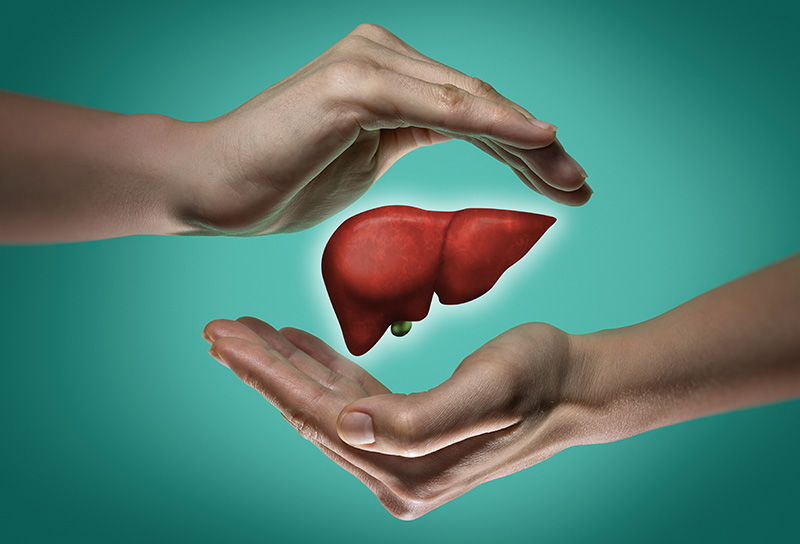
When you think about your health, your liver is probably not the first organ that comes to mind. Your heart, your lungs, and your kidneys probably all come to mind before your liver, but don’t be fooled—the liver plays a very important role in our overall health. It is involved in over 500 body functions including:
- digesting proteins
- cleansing blood
- producing bile
- regulating the balance of hormones
- balancing your cholesterol level
- monitoring your body’s supply of essential vitamins and minerals
- providing your body with energy
- fighting off infections and harmful substances called toxins
- helping your blood clot
Protecting your liver
Some people are more likely to develop liver disease than others, because they can inherit a liver disease, but a number of other factors can damage your liver and raise your risk of developing liver diseases. These factors include certain viruses, alcohol use, and obesity. Over time, liver disease can lead to cirrhosis (scarring of the liver), which can cause liver failure. However, early treatment can enable your liver to heal.
The lifestyle choices you make every day have an impact on your health. In addition to contributing to your general health, there are steps you can take that will help keep your liver functioning properly and reduce your risk of developing liver disease. These steps include:
- If you have had hepatitis (inflammation of the liver) or are at risk of developing it, talk to your healthcare provider about getting vaccinated.
- Avoid coming in contact with other people’s blood and body fluids, which can spread hepatitis if not handled properly.
- Avoid risky behaviours. For example, use a condom during sex; if you decide to get a tattoo or body piercing, be careful about the cleanliness of the place where you will have it done; if you use injectable drugs, do not share needles.
- If you drink alcohol, do so in moderation.
- Keep your food safe. Wash your hands thoroughly before preparing or eating food.
- Maintain a healthy weight, because obesity can cause nonalcoholic fatty liver disease.
- Use medications wisely. Take them only in the recommended doses, don’t mix medications with alcohol, and talk with your doctor or London Drugs pharmacist before mixing them with herbal supplements or nonprescription drugs.
- Be careful when using aerosol sprays such as insecticides, fungicides, toxic chemicals, and paint. Always follow the manufacturer’s instructions, use them in a well-ventilated area, and wear a mask. Protect your skin by wearing gloves, a hat, and long sleeves.
- If you plan on travelling, talk to your London Drugs pharmacist about our travel clinics where you can get any needed vaccinations and learn what preventive steps you need to take to safeguard your health.
Liver diseases
There are a number of different conditions that can affect the liver, and they are referred to as hepatic diseases. Common types include:
- Alcoholic liver disease results from drinking too much alcohol, and it damages the liver.
- Cholestasis occurs when the flow of bile from the liver is reduced or blocked completely. It can result from some drugs, genetic factors, or pregnancy. Or a blockage can be due to a tumour or a gallstone that gets stuck in the digestive system.
- Cirrhosis is a hardening of the liver that results from the formation of scar tissue. Heavy drinking of alcohol as well as certain viruses are often the reason for the scarring. Cirrhosis can also be caused by diabetes, immune system problems, and genetic diseases.
- Hepatitis is the medical term for inflammation of the liver due to any cause. It can lead to a variety of life-threatening conditions, such as liver cancer or liver failure.
- Non-alcoholic fatty liver disease happens when fat deposits form in the liver and prevent it from removing toxins from your body.
While liver diseases don’t always cause symptoms, some common warning signs that you may have a liver disease include:
- loss of appetite
- nausea or vomiting
- tendency to bruise easily
- chronic fatigue
- skin that is itchy or appears yellowish
- abdominal pain and swelling
- swelling in the legs and ankles
- dark urine
- pale stool colour
If you suspect that you may have a problem with your liver, talk to your healthcare team about any tests that you should have to help determine the cause of your symptoms.
References used:
- Cleveland Clinic. Liver. Available at https://my.clevelandclinic.org/health/articles/21481-liver
- Johns Hopkins. Liver Health. Available at https://www.hopkinsmedicine.org/health/conditions-and-diseases/liver-health
- Canadian Liver Foundation. You may never stop to think about it, but your liver is essential to your life. Available at https://www.liver.ca/your-liver/
- Mayo Clinic. Liver disease. Available at https://www.mayoclinic.org/diseases-conditions/liver-problems/symptoms-causes/syc-20374502

